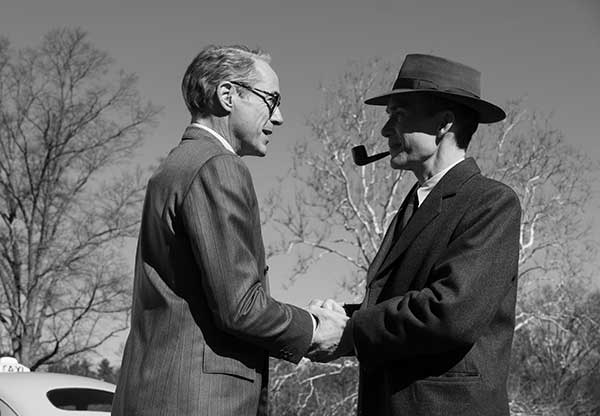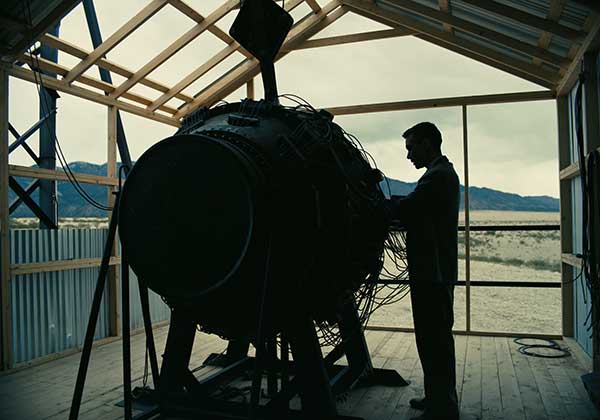In Oppenheimer, fact and spectacle are at war and Christopher Nolan’s fractured man trope can’t disappear within his usual grand fiction.
Oppenheimer‘s director Christopher Nolan has always been interested in the fractured man and their search for penance within his filmography. Inception took a man into a dreamworld tailspin desperately seeking retribution for his own actions in order to be with his family again; His Dark Knight trilogy featured a version of Bruce Wayne traversing various debilitating routes in the hope of personal acceptance; Even The Prestige is a sly indictment of male hubristic grief. Nolan’s use of scale and adept ability at creating blockbuster entertainment has kept this mostly obscured in the undercurrent of his films.
If society was less patriarchal, perhaps Nolan’s inability to split away from diving into the male psyche would be called out on as a trope of his more, not unlike how social media bemoaned Greta Gerwig’s supposed lack of POC representation when she was only two movies into her filmography. That Nolan’s powerful but tortured protagonist are always underneath the fictional spectacle and the spellbinding technical achievements of his filmography is what makes Oppenheimer, a scorchingly volatile, searing biopic about the real life creator of the atomic bomb, such an interesting outlier within Nolan’s career. Not because Nolan as a filmmaker has decided to change his ways or that his singular vision on the broken males that populate his films has pivoted, but because Nolan makes Oppenheimer, and thus himself, unable to hide from the cold truth of objective reality.
The Prometheus/Oppenheimer Conflation

Oppenheimer follows the story of the father of the atomic bomb J Robert Oppenheimer (Cillian Murphy) going from a struggling student with a killer intent to national war criminal to victim of an almost-certainly justified character assassination. Adapting from Kai Bird and Martin J Sherwin’s novel, “American Prometheus: The Triumph and Tragedy of J. Robert Oppenheimer,” Nolan takes the novel and breaks it apart linearly speaking, constructing the film from disparate timelines – some coloured, some in black and white – that are extracted from Oppenheimer’s life and spliced intermittently throughout in a way not dissimilar to that of Nolan’s other time-jumping desaturated film Memento, albeit not quite as neatly contained linearly as that film is.
The story of Prometheus, succinctly: A god gives fire to humans and is punished by being chained for all eternity as an eagle eats his liver every day. The idea of conflating Oppenheimer with Prometheus in a literal sense falls apart as soon as you see that Oppenheimer wasn’t punished but was instead heralded by a society and American government happy to be playing with the fire given to them. Figuratively speaking, within the film and – if a shred of humanity remained within him before his passing – the chains that bind Robert Oppenheimer are those of guilt, the tendrils of which suffocate the womanising scientist after the fact. This character conflict that turns Oppenheimer into the fractured man trope arrives so late that you’ve almost become desensitised to Oppenheimer’s obsessions, Nolan himself becoming too riveted with the spectacle of the Trinity Test. John Adams once quoted, “great is the guilt of an unnecessary war”.
Oppenheimer seceding control of the Atomic Bomb after the successful Trinity Test is reminiscent of the tale of Doctor Frankenstein, not quite knowing the consequences of what he creates. What’s intriguing about this comparison is the discussion around the Hydrogen Bomb – the bigger bomb hypothesised by Edward Teller (Benny Safdie) – within the film. Oppenheimer is shown that his creation of the atomic bomb is of vital importance, to be the first to create it in order to stop Russia and Germany from finalising their research into it. President Truman (Gary Oldman) using the bomb on Hiroshima and Nagasaki changes the perspective of Oppenheimer from callous creativity to repentance for what his obsession in committing his theory to practical form has caused. As the famous novel reads, “Shall I create another like yourself, whose joint wickedness might desolate the world. Begone!”
The Tragedy of Oppenheimer

Oppenheimer himself is handled by Nolan as a tragic hero, and when the removal of his security clearance is supposed to achieve audience empathy, it’s difficult to root for a man who was an accessory to the murder of hundreds of thousands of Japanese people. The argument over the Red Scare of Mccarthyism and the nationalist medley of American politics seemingly always achieving a frightening level of zero nuance will rage on, no side acquiescing power. Oppenheimer presents the character as conflicted between these two pervasive political states as Oppenheimer‘s actions consistently revolve around his own ego, playing god with a power he can’t quite fathom. He’s shown riding a horse, iconoclastic of Western Americana as he sheds the soldier outfit he wears to become a lone ranger in a wide-brimmed hat straddling a noble steed towards what he thinks is the greater good.
Film as an empathy machine can do magnificent things, but when you’re dealing with unnavigable constants like the deaths of thousands, it’s difficult. That Oppenheimer broaches these difficult conversations is to be admired, especially as the film lingers on the synapses for days because of the formality that Nolan executes blockbuster entertainment melded with a character study that is steeped in unfathomable guilt. His portrait of Oppenheimer is one of difficulty and thus this fractured man in Nolan’s filmography is diametrically different to the rest by not being fictional, conflicting with his usual blockbuster sensibilities. Oppenheimer is not a standard Christopher Nolan film. He can’t hide his characters trauma and fragmented psyche behind the CGI pizzazz of worlds folding in. Nolan’s fictional freedom is limited by the inescapable fact of adapting a real person.
What he can do is create a film that is vastly entertaining, even when spending its first act as a dreary rendition of biopic satire Walk Hard as love interest Jean Tatlock (Florence Pugh) jumps up in the middle of sex to get Oppenheimer to read the phrase ‘now I am become death, destroyer of worlds’ in Sanskrit. After this start, as we enter the desert town of Los Alamos that was constructed for the purpose of detonating an atomic bomb, the film flourishes. The film flits back and forth between Oppenheimer‘s interactions with Lewis Strauss (Robert Downey Jr.) and flashbacks to a relationship with Jean that imploded his marriage worse than his affiliation with attempted genocide did. Once stripped away from the non-fictional elements of the story, the script can finally be the snappy Nolan fiction that he thrives on.
A New But Familiar Frontier For Nolan’s Fractured Man

Oppenheimer marks a new venture for Chris Nolan. The fictionalised fractured men at the heart of his films are front and centre here, with the most devastating weapon ever fired the only narrative device he can hide the fragility behind. It’s his most mature, formally impressive film to date in a career of formally impressive films as his dives into a character’s psychological disrepair from the perspective of intrusive human thought. How much of the abstract nightmare that makes up the final third that is real is up to interpretation; is the murderously black gloved hand that appears for a single shot only existing within the depths of a stress induced fever? Is it the FBI, curtly assuaging Oppenheimer to continue with the creation of the bomb? Oppenheimer has scenes that wouldn’t be that far fetched inside the filmography of Darren Aronofsky, as hellish visuals haunt the messianic father of the atomic bomb.
Whether the story required a non-linear telling is neither here nor there as its construction means the film flows so fluidly, having the rhythmic cadence of an atomic waveform signature. Each scene hits an apex of robust, adult drama with its own mini denouement before resetting and repeating without ever getting monotonous. A symptom of Nolan’s blockbuster sensibilities and finely tuned craft.
With each of the vast A-list cast at the top of their game (A scene stealing Emily Blunt has more than a tad too little screen time), a gently booming Ludwig Göransson score and Nolan firing on the psychological cylinders they’ve only briefly fired in this way prior, Oppenheimer runs like a child in high heels; an unsteady, slightly terrifying ordeal that could topple at any moment. History may persist with the idea Oppenheimer was correct in what he did, but at what cost of lives are we to continue to believe this? Nolan’s character study into the fractured man of Oppenheimer, his protagonist no longer able to disappear behind blockbuster entertainment, is a dizzying, gargantuan movie whose epic scale fights against its emotive capabilities as this daring three hour epic runs the thin gauntlet between becoming a piece on martyrdom or a tale of deserved damnation.
Oppenheimer is now available to watch on digital and on demand. Read our review of Oppenheimer!

